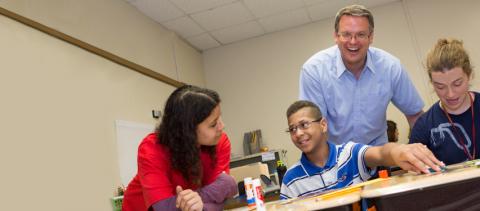
UROC’s after-school program helps young people discover community involvement

Listen up adults: If you want young people to become active, eager contributors to their communities, one of the first things you need to do is figure out who you have to be in order to help them do that. Ross VeLure Roholt, an associate professor in the University’s School of Social Work in the College of Education and Human Development learned that early in his career while working with youth.
Over the last decade, he’s made youth civic engagement the focus of his work. “I’m particularly interested in understanding how we can best work with young people in organized and supportive ways that invite their contributions to community development,” he explains. “They have ideas about what they want their communities to look and be like, but we have to allow them the chance to be the actual organizers, designers and implementers of what makes their worlds better for them.
The key, Roholt says, is simpler than you might think. Talking with young people over the years, the main thing they always say is important to them is consistency. If you say you’re going to be there for them, be there. And once you are there, listen. Of the over 2,000 kids he’s talked with while doing civic youth work in the U.S., Morocco, Palestine, Israel, Northern Ireland, Korea, Laos and the Netherlands, he’s never met one who didn’t have clear ideas about the issues he or she would like to work on and change in their communities.
Roholt stresses theses points in his classes at the University. And through a partnership between the University’s Urban Research and Outreach-Engagement Center (UROC) and Kwanzaa Community Church in North Minneapolis, he and his students are using their know-how working with students in a new after-school program. Roholt’s students volunteer weekly with the 21st Century Academy program, which was launched last fall as part of the partnership.
The goal of the collaboration is to encourage kids to learn about the history of north Minneapolis, and to have ongoing, reflective conversations with them about ways they would like to contribute to their community. "The role that professor Ross and the University of Minnesota students play in the success of the 21st. Century Academy is immeasurable,” says Pastor Alika Galloway. “The students are great teachers, but their presence also models for the young scholars that attending college is possible.”
As someone who has seen how important it is for youth to receive the support they need to create positive change in their communities, Roholt is excited about how the collaborative effort will evolve over time. “Ideas always become richer when you bring people from different contexts together to share their thoughts because all kinds of questions arise and you go in interesting directions,” he says. “That’s how you build communities.”